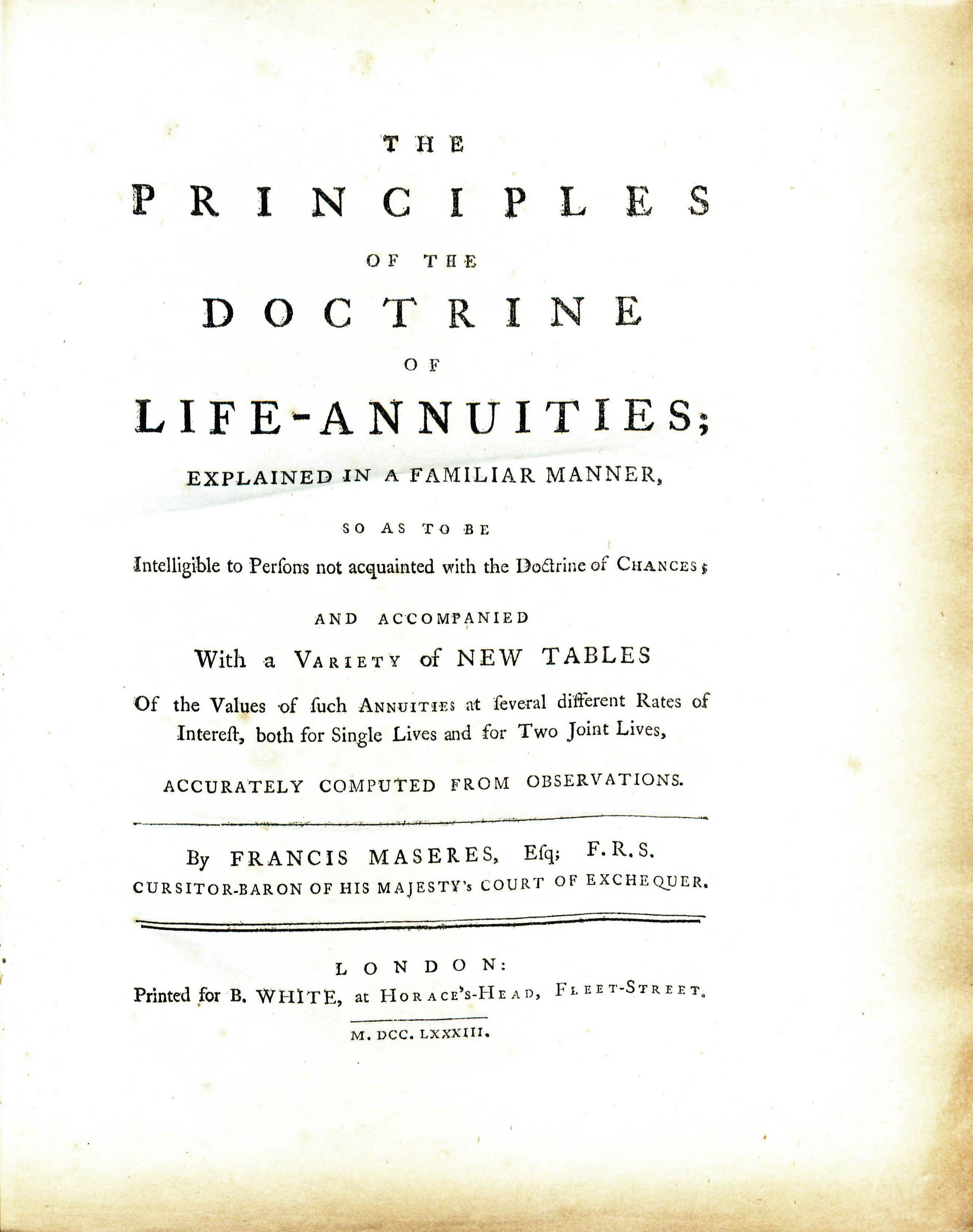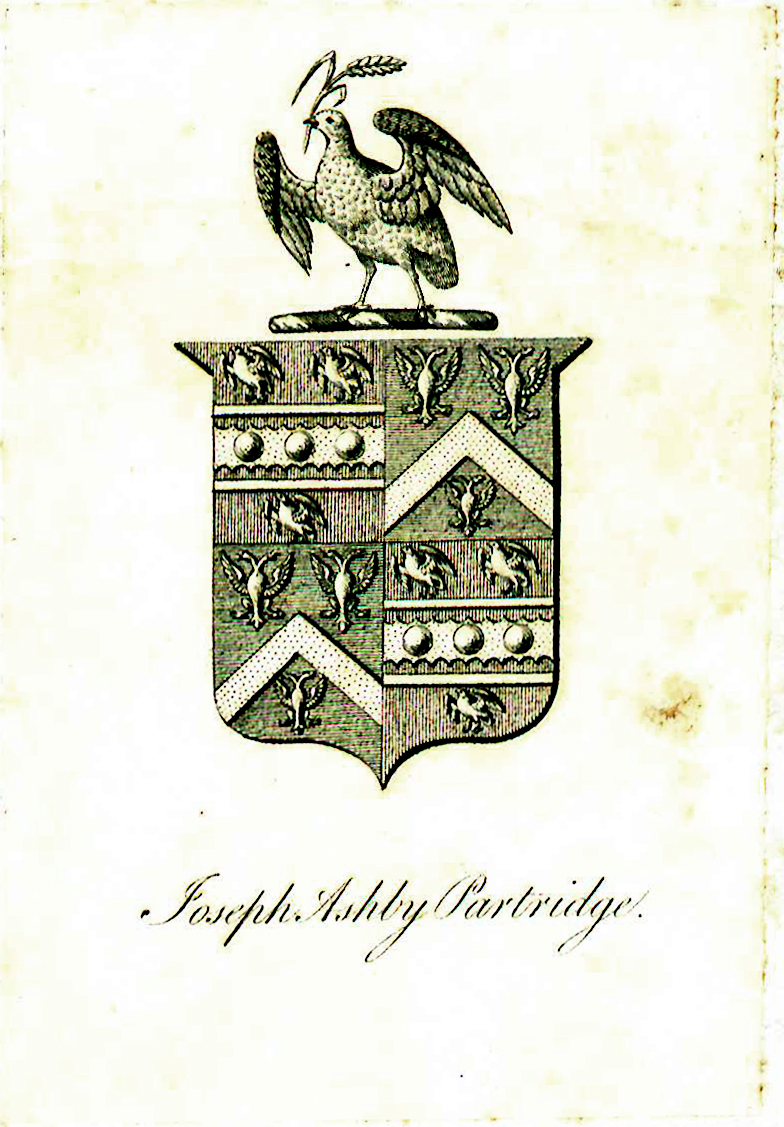Difference between revisions of "Principles of the Doctrine of Life-Annuities"
m |
m |
||
| Line 21: | Line 21: | ||
|desc= | |desc= | ||
|shelf=B-5 | |shelf=B-5 | ||
| − | |||
}}[[wikipedia:Francis Maseres|Francis Maseres]] (1731 – 1824), author, lawyer, mathematician was born in London to a family of French protestant descent. Educated at [http://www.clare.cam.ac.uk/College-History/ Clare College, Cambridge,] Maseres entered the [[wikipedia:Inner Temple|Inner Temple]] in 1750 and qualified for the legal profession in 1758.<ref>J.J. O'Connor and E.F. Robertson, [http://mathshistory.st-andrews.ac.uk/Biographies/Maseres.html "Francis Maseres,"] in ''MacTutor: History of Mathematics Archive,'' accessed April 6, 2021.</ref> After a few mediocre years practicing law, Maseres was appointed attorney general of the [[wikipedia:Province of Quebec (1763–1791)|Province of Quebec]] in 1766.<ref>Elizabeth Arthur, [http://www.biographi.ca/en/bio.php?BioId=37123 "Maseres, Francis,"] in ''Dictionary of Canadian Biography,'' vol. 6, University of Toronto/Université Laval, accessed March 10, 2020.</ref> He served in this position for three years before returning to England. In 1771 he became a fellow of the [[wikipedia:Royal Society|Royal Society]]. Two years later he was appointed [[wikipedia:Cursitor Baron of the Exchequer|Baron of the Exchequer]] and served on the [[wikipedia:Exchequer of Pleas|Exchequer of Pleas]] from 1773 until his death in 1824. From 1780 to 1822, he also presided as senior judge of the sheriff's court in London.<ref>Ibid.</ref> | }}[[wikipedia:Francis Maseres|Francis Maseres]] (1731 – 1824), author, lawyer, mathematician was born in London to a family of French protestant descent. Educated at [http://www.clare.cam.ac.uk/College-History/ Clare College, Cambridge,] Maseres entered the [[wikipedia:Inner Temple|Inner Temple]] in 1750 and qualified for the legal profession in 1758.<ref>J.J. O'Connor and E.F. Robertson, [http://mathshistory.st-andrews.ac.uk/Biographies/Maseres.html "Francis Maseres,"] in ''MacTutor: History of Mathematics Archive,'' accessed April 6, 2021.</ref> After a few mediocre years practicing law, Maseres was appointed attorney general of the [[wikipedia:Province of Quebec (1763–1791)|Province of Quebec]] in 1766.<ref>Elizabeth Arthur, [http://www.biographi.ca/en/bio.php?BioId=37123 "Maseres, Francis,"] in ''Dictionary of Canadian Biography,'' vol. 6, University of Toronto/Université Laval, accessed March 10, 2020.</ref> He served in this position for three years before returning to England. In 1771 he became a fellow of the [[wikipedia:Royal Society|Royal Society]]. Two years later he was appointed [[wikipedia:Cursitor Baron of the Exchequer|Baron of the Exchequer]] and served on the [[wikipedia:Exchequer of Pleas|Exchequer of Pleas]] from 1773 until his death in 1824. From 1780 to 1822, he also presided as senior judge of the sheriff's court in London.<ref>Ibid.</ref> | ||
Revision as of 14:19, 13 September 2023
by Francis Maseres
| Principles of Life-Annuities | |
|
Title page from The Principles of the Doctrine of Life-Annuities, George Wythe Collection, Wolf Law Library, College of William & Mary. | |
| Author | Francis Maseres |
| Published | London: Printed for B. White |
| Date | 1783 |
| Edition | First |
| Language | English |
| Location | Shelf B-5 |
Francis Maseres (1731 – 1824), author, lawyer, mathematician was born in London to a family of French protestant descent. Educated at Clare College, Cambridge, Maseres entered the Inner Temple in 1750 and qualified for the legal profession in 1758.[1] After a few mediocre years practicing law, Maseres was appointed attorney general of the Province of Quebec in 1766.[2] He served in this position for three years before returning to England. In 1771 he became a fellow of the Royal Society. Two years later he was appointed Baron of the Exchequer and served on the Exchequer of Pleas from 1773 until his death in 1824. From 1780 to 1822, he also presided as senior judge of the sheriff's court in London.[3]
A prolific author of both legal and mathematical texts, Maseres outlines the concepts behind creating formulas for insurance annuities in Principles of the Doctrine of Life-Annuities. The book also contains complex mathematical formulas depicting how the author arrived at his precise calculations for specific amounts of money and policies. The book is considered explanatory and educational, expounding upon the practices used by insurers in terms of granting and drafting life insurance policies.
Evidence for Inclusion in Wythe's Library
Listed in the Jefferson Inventory of Wythe's Library as "Masere's principles of life annuities. 4to." This was one of the titles kept by Thomas Jefferson and later sold to the Library of Congress in 1815. Both the Brown Bibliography[4] and George Wythe's Library[5] on LibraryThing include the first edition (1783) published in London based on Millicent Sowerby's entry in Catalogue of the Library of Thomas Jefferson.[6] Unfortunately, the volume owned by Wythe no longer exists to verify the edition. The Wolf Law Library followed Brown and Sowerby and purchased a copy of the 1783 edition.
Description of the Wolf Law Library's copy
Bound in contemporary paper boards with manuscript author's name to spine. Includes the armorial bookplate of Joseph Ashby Partridge on the front pastedown. Purchased from Robert Walker Antiques.
Images of the library's copy of this book are available on Flickr. View the record for this book in William & Mary's online catalog.

